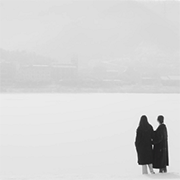|
blackguy32 posted:When I first watched it in the theater, this was the thing that stuck out to me really badly and if I were to say anything that turned me off the movie, it was this. I thought her boyfriend Gabe didn't really need to be there or he at least needed an arch. As it stands, he shows up and preaches a bunch of whitesplaining poo poo but the film never really says anything about it and for the most part, simply ignores it. In general I think this film tries to be all-encompassing with its political issues. Which I think is entirely understandable, but it does come at the cost of skimping on depth and creating a more engaging story. I'm okay with that; it is still a great film.
|
|
|
|

|
| # ? Apr 20, 2024 02:52 |
|
Vegetable posted:That boyfriend shows how hard it is for a black person, particularly a female, black-power activist, to date outside their race though. She was literally sleeping with a powerful white man. It feels like something that could realistically be used to tar a good number of black women. I find that the difficulty lies in other areas though. I feel a more pressing issue would have been to say that most white guys aren't going to fall in love with a black woman, and I thought the whole mixed race person thing was trite since it has been done to death in movies.
|
|
|
|
Not wanting to take a jab, but what movies come to mind on the subject of mixed race/interracial relationships?
|
|
|
|
FAT BATMAN posted:Not wanting to take a jab, but what movies come to mind on the subject of mixed race/interracial relationships? To varying degrees and tones: West Side Story, Shadows, Save the Last Dance, Jungle Fever, Guess Who's Coming to Dinner, Crash (in part), M. Butterfly, Monster's Ball, La Permission, or The Story of a Three Day Pass... That being said, I think with Dear White People specifically it's unfair to say that it portrays a interracial relationship in a way that's cliched, strained, or hackneyed, since Simien very deliberately doesn't tell us that much about who Sam and Gabe are as a couple. But I think the way that Simien carefully constructs his scenes in transparently rhetorical terms only to twist them dramatically to reflect the ambiguity of real-life is illustrated quite well by just this aspect of their relationship. Consider how we first meet Gabe, which is after the showing of The Re-Birth of a Nation in Sam and his film class. Notably, every other student in the classroom - with particular attention focused on uncomfortable white faces - are completely silent. They are neither willing nor able to engage with the content of what Sam has depicted. It's Gabe who lends the sole voice of criticism, attacking the technical qualities and social accuracy of Sam's film. Simien intentionally paints Gabe and Sam's relationship as fundamentally antagonistic so that it mirrors her conflicts with other privileged white males, most obviously Kurt Fletcher. Simien then twists the implications of this ideological conflict by literally having Sam and Gabe have sex. After they finish, Gabe asks Sam "what they are doing," suggesting that this relationship has been going on for a long time. Sam insists that their relationship is merely physical, but Sam's subsequent encounters and eye-contact with Gabe (such as in the scene where she kisses Reggie) makes it evident that this is a falsehood. Essentially, what Simien initially paints as another power-driven, narcissistic male white student attacking Sam's political convictions, he expands upon to reveal as a genuinely loving relationship. In essence, the difference between Gabe and his fellow white film students and Kurt is that he's more interested in engaging with Sam as a human being than with A) looking racist, or B) defeating her. And, remember, this relationship didn't just drop out of thin air. It functions as characterization: It tells us that Sam and Gabe developed a mutual attraction for each other in a social context exclusive of (possibly prior to) her politicization. This is important, because Sam's obsessive disguising of this emotional reality runs completely at odds with her rhetorical emphasis on 'keeping it 100.' It turns out that '100' doesn't mean being '100% honest,' but acting in a superficially 'defiant' manner that is socially acceptable. Her personal arc as a character is integral to the political implications of the story: In throwing off (or at the least reconciling) her social insecurities and embracing her true emotions (really keeping it 100), she hits upon a genius (almost evil genius) act of social subversion. It turns out that after Fletcher explicitly forced his son to cancel the Hip Hop party, she forced secretly endorses it to actively expose the entrenched racism of the school's white community. (I don't recall quite clearly, but I think another clever bit of writing was that Sam's fake invite never explicitly calls for party-goers to attend in blackface; she just assumes it will happen, and is proved right.)
|
|
|
|
K. Waste posted:In throwing off (or at the least reconciling) her social insecurities and embracing her true emotions (really keeping it 100), she hits upon a genius (almost evil genius) act of social subversion. It turns out that after Fletcher explicitly forced his son to cancel the Hip Hop party, she forced secretly endorses it to actively expose the entrenched racism of the school's white community. (I don't recall quite clearly, but I think another clever bit of writing was that Sam's fake invite never explicitly calls for party-goers to attend in blackface; she just assumes it will happen, and is proved right.)
|
|
|
|

|
| # ? Apr 20, 2024 02:52 |
|
Honest Thief posted:Not sure Sam was the one sending the invites, given the clear hint of her infatuated friend knowing how to frame her. It's certainly at least somewhat ambiguous, but this precipitates questions not only about characters' motivations, but also actions in response to the Hip Hop party coming to fruition. Reggie has the ability to frame Sam, but the ability isn't a reason: Why would he want to frame her? (Because she abandons the cause? I think this is a bit cynical to assume and not consistent with the persistence of his politics with contrast to Sam, but it's a fair point to be argued.) Furthermore, What does Reggie have to gain from enticing an obscene, racist party to take place in and of itself? Why should he not be satisfied that the event was canceled? Let's remember that, even if we assume Reggie is behind it all, the Black student union isn't alerted by himself, but by spontaneously politicized Lionel. This is crucial, because when the Black student union gets to the party, Simien doesn't portray their collective reactions to the event as, like, subtle or differentiated. Reggie is just as galvanized as everybody else. It's Sam who just shows up there with a camera in hand ready to record everything, calling back to the opening of the movie when all of the primary cast are watching television with a vacant, morbid, spiritually defeated look on their faces, but Sam is aiming her camera right at the screen, reversing the gaze of the spectator onto his/herself. An overarching motif of the film's frame narrative is the control that Sam possesses over the narrative of the film itself as a filmmaker, which is a pretty much a direct analogy for what Simien is doing, similar to how the tagline for the movie is actually the name of a reality T.V. series managed by a guy that Simien characterizes as encouraging "Coco" to act out in cliche and antagonistic ways in order to get media spotlight. I feel like a lot of people really neglect just how dark and morally ambiguous the conclusion of Dear White People actually is. When Coco is at the same party as Sam, her half-hearted soliloquy to her camera is nonetheless a tacit rebuke of what the Black student union has done. But Sam then selectively edits this material so that it becomes a direct commentary in support of her own thesis film, the one that finally earns the applause of her liberal arts classmates (so of whom presumably could have been at the loving party, blackface or no). Your point about Reggie's ability to frame Sam is legitimate, but that framing device works both ways: Sam can realistically use it to frame Reggie, but neither character explicitly does this.
|
|
|







